The Importance of Eating Local When You Travel

During my time living in Taiwan, feta cheese, chickpeas and couscous were luxuries that couldn’t be picked up from just any local supermarket. There were far fewer imported goods than what you would see on the shelves of your average UK supermarket, and you couldn’t get fruits or vegetables when they weren’t in season.
At first, I thought this was awful. I wanted to eat dragon fruit all year round! Then, one of our Taiwanese friends said to me: “The earth provides what the body needs at the time it needs it. In the winter, when you need warmth, ginger grows. In the summer, when the weather is hot, watermelons are everywhere.”
I came to realise that eating and buying seasonal, locally grown food was much better. Not only when living at home, but also when travelling.
Local Food is Part of the Culture
Experiencing the local culture is a huge part of travelling and trying traditional food is largely connected with that cultural experience. Visitors to the UK always want to eat fish and chips, Vietnamese pho is the big pull for travellers in Vietnam, and here in Costa Rica it’s all about gallo pinto.
Traditional foods are part of a country’s heritage and are strongly rooted within the memories of the local people. One of my childhood fondest childhood memories of growing up in the UK is eating piping hot fish and chips wet with vinegar on the stormy seafront, while flecks of cold rain hit against my cheeks. Here in Costa Rica, you won’t meet a tico who doesn’t know how to cook gallo pinto, a dish that has passed through generations. It’s the same all over the world and trying traditional foods is a good way to taste a small part of that culture.
Local Food Supports the Community
Supporting the local community is a really important aspect of travel. You can go anywhere in the world and walk into a McDonalds, but instead of benefiting the local community, a large chunk of what you’ve just spent is leaving the local economy. In places where tourism is booming and the demand for Western and fast food is high, local food will become less and less prevalent. These kinds of issues mean that local people in countries across the world are rightfully dubious about tourists and how much good they really do for their home country.
Opting to drink coffee in a local café, snack on street food or have lunch in a local eatery is a simple way to be a socially responsible tourist. Eating in local places supports local businesses and the local economy, and it also builds connections between the local people and travellers. Travellers only staying in one place for a couple of days might think that it’s too short a time to build any relationships, but where you eat will constitute part of the local community’s perception of tourists and sometimes even nationalities as a whole.
Local Food is Better for the Environment
Flying food across the world means a bigger carbon footprint. The average distance our food travels is 1500 miles, and when you start adding that up it’s a lot of energy. Locally grown food doesn’t have half as far to travel and you can usually find local farmers who use sustainable farming methods. Buying locally also means supporting the farmland and green spaces in that area, whether you’re at home or travelling. While we’ve been house sitting in Costa Rica, Luke and I have been buying as much of our food as possible from local farmer’s markets, the local baker and even the neighbours of our house sitters – it definitely doesn’t travel half as far as we do.
Local Food is Fresher & Tastes Better
There is no denying that when your food hasn’t had to travel half way around the world, it’s much fresher. Fruit and vegetables that have been for days in the back of a truck aren’t going to taste like the ones dug up from the allotment down the road. When you travel, you won’t always know which foods are locally grown, but buying from local businesses and markets instead of the chain supermarkets is a good place to start.
Local food is also seasonal, and seasonal food tastes better too. Think about eating a ripe tomato in the summer, bursting with flavour. Compare that to a tomato eaten in the winter, which sometimes just tastes weak and watery. Eating seasonal food is also great because it supports our body’s natural balance. In summer, watermelon, cucumber and courgettes help to cool the body. In colder months, antioxidant-rich root vegetables are harvested; these keep us warm and protect us from illness.
Eating local when you travel…
Before this year, I’d never eaten a rambutan, a chayote or a yuca. If I hadn’t been eating local food, I never would have either. Local foods are different everywhere you travel, they grow depending on the climate and seasonal changes of that country, and there is always something new waiting to be discovered.
Do you eat local when you travel? What are the most awesome foods you’ve discovered?
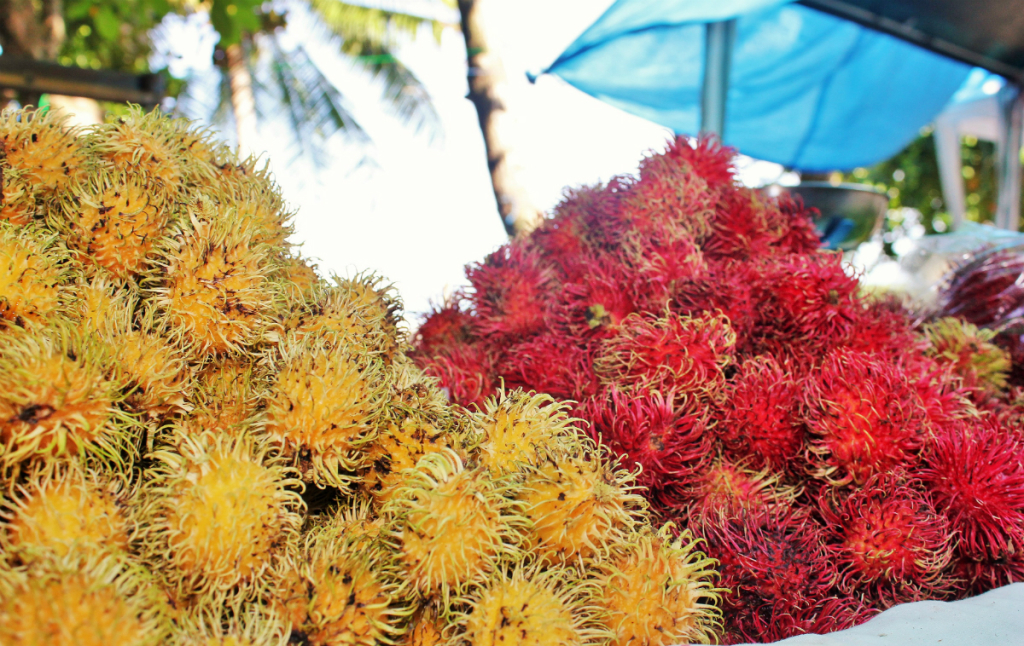
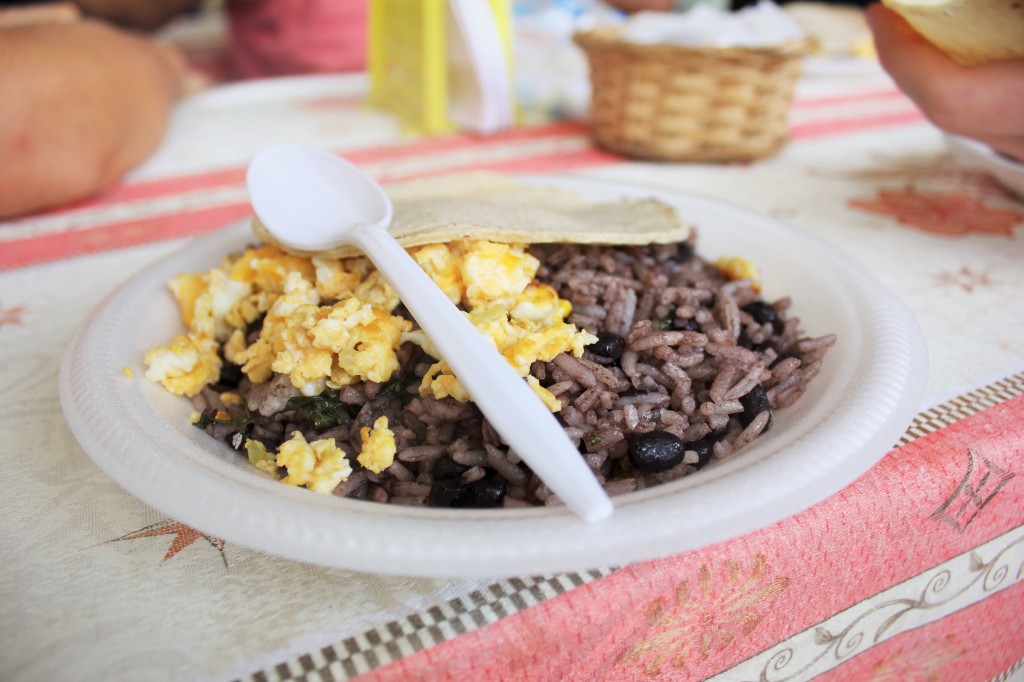
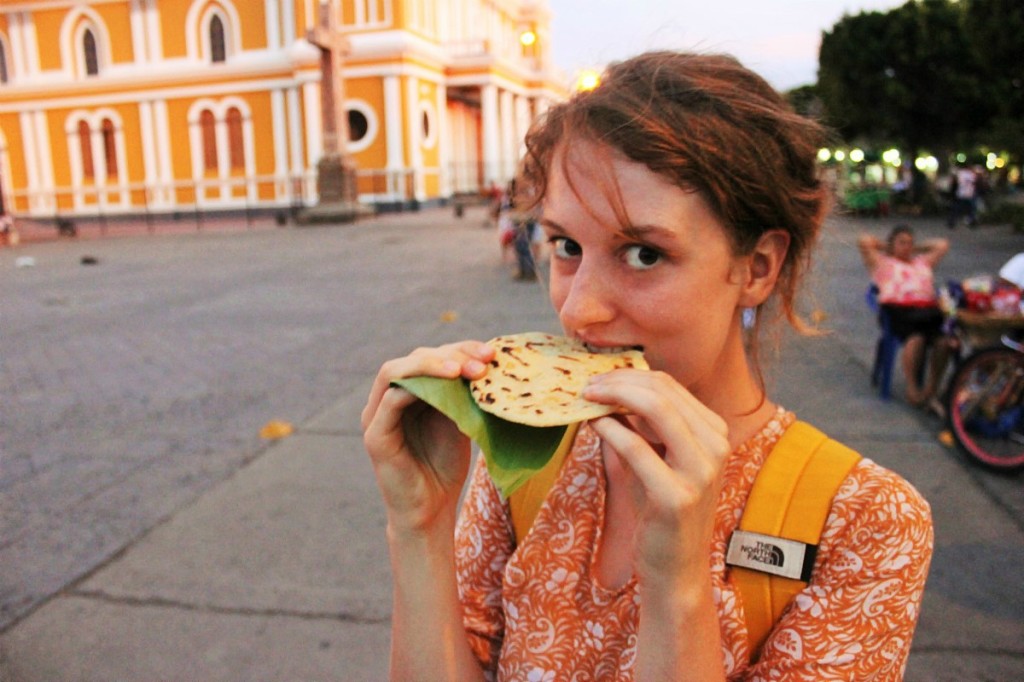
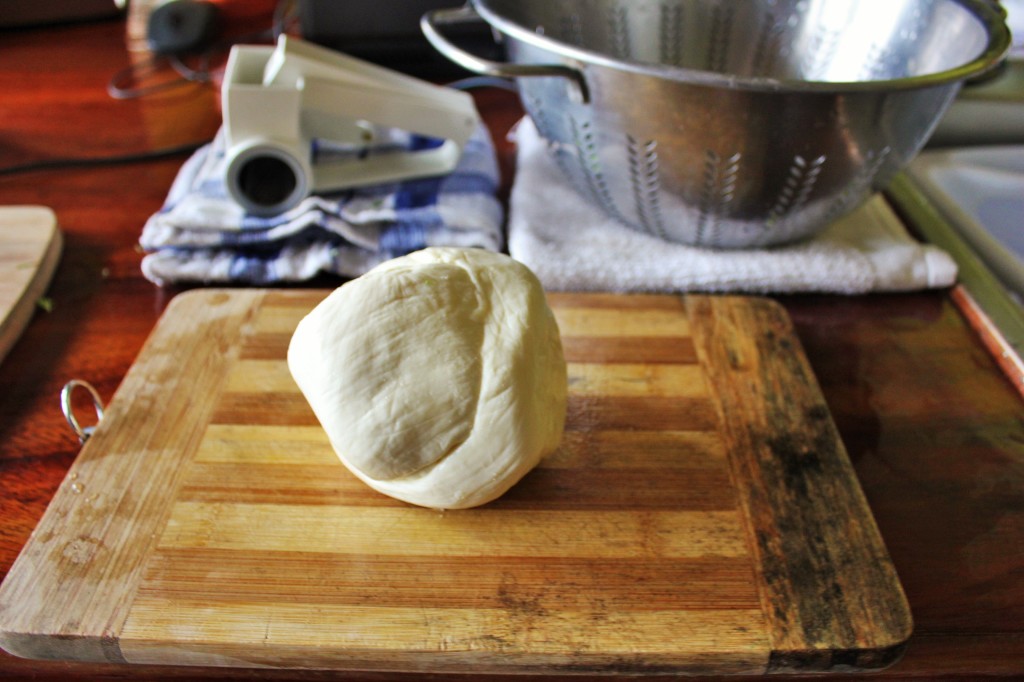
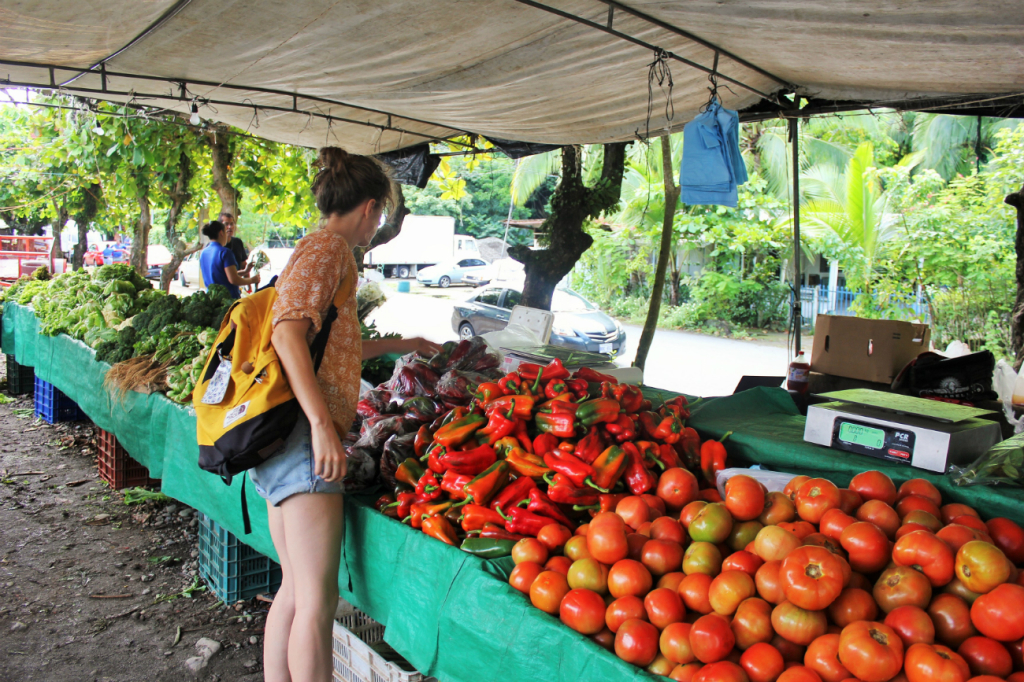





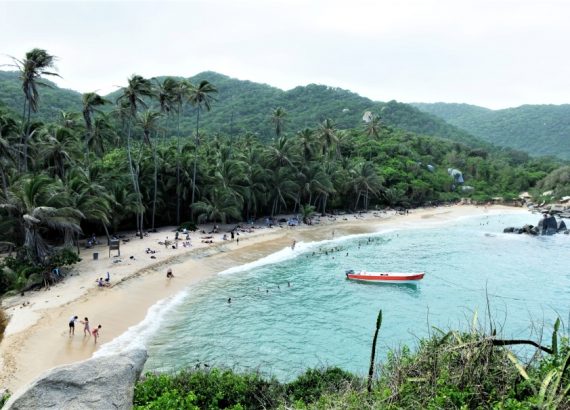
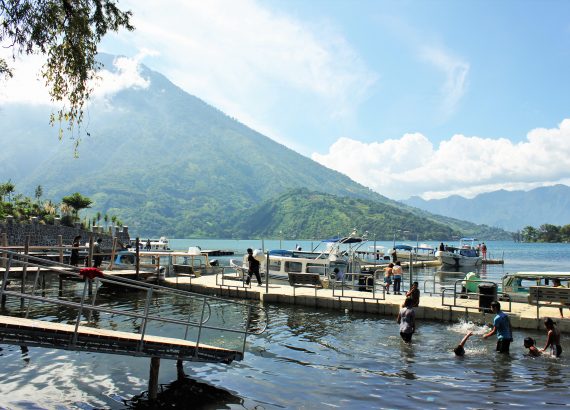

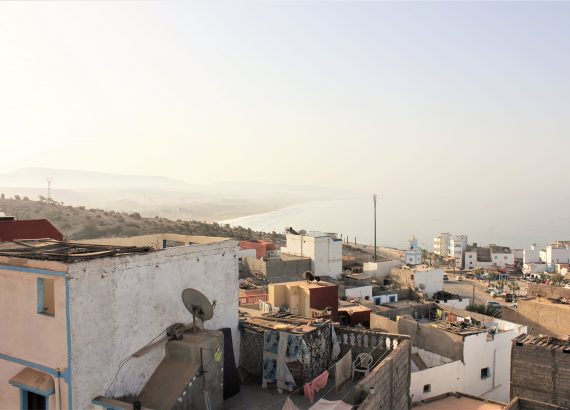
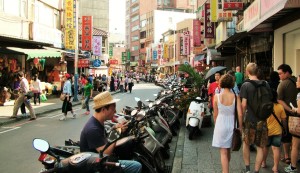


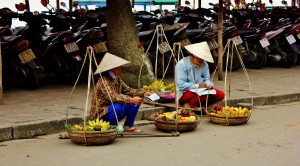


francaangloitalian
We always try to eat local and we have been doing it since we started travelling. Since we turned vegans we cannot try everything on offer but it’s not a problem at all, it’s actually an extra challenge for us to try to find the local vegan dish we can taste. I have too many favorite local meals.. I love food! :)
Charlie on Travel
That’s super awesome, Franca. Yes, the same with vegetarianism too, though definitely easier than veganism. From what I’ve read about your vegan eating though, it looks like you’ve been doing an awesome job of finding vegan places!
Polly
I recognize Granada!
I totally agree that it’s important for a number of reasons to eat local while traveling. While it’s usually quite easy to hole yourself up in a comfortable chain restaurant, where’s the fun in that?!
Charlie on Travel
Yes, beautiful huh? :) You’re right about the fun – it’s not very exciting for sure!
Shing
Fantastic message Charlie! I agree with everything you have written, where possible I try to eat and spend money locally too. Apart from the fact that it usually tastes better and of course is more authentic, it’s also about what your Taiwanese friend said:
“The earth provides what the body needs at the time it needs it. In the winter, when you need warmth, ginger grows. In the summer, when the weather is hot, watermelons are everywhere.”
Eating seasonal food is more economical, efficient and eco-friendly, and above all, it’s a nice way to feel more connected with nature. Who doesn’t love going to farmer’s markets? Or picking fruit off the bramble!
“In places where tourism is booming and the demand for Western and fast food is high, local food will become less and less prevalent. These kinds of issues mean that local people in countries across the world are rightfully dubious about tourists and how much good they really do for their home country.”
Amen. I’m sick of hearing how tourism is good for a country’s economy. Done rightly, yes I agree it is, but most of the time there is no emphasis on sustainable travel. Most of the time tourism – mass tourism – is only good for the rich people on top who own the big hotels and the big restaurants but what about local life? It’s no where to be seen! The consequence of mass tourism is the death of local life. It can wipe away small businesses, families, nature and then what’s left? The vision of greed.
Charlie on Travel
Hey Shing! That’s awesome, and yes you’re right, everyone loves picking fruits from the bushes and farmer’s markets, well I hope they do anyway! I completely agree with you when it comes to the tourism/local economy argument. I think that a lot of people just don’t really think about it and just think, ‘well, sure, I’m in the country, spending my money there,’ but it’s almost certainly not the case in areas where foreign owned chain restaurants and hotels have been able to butt in. It’s also not a unique experience to stay in the nearest Hilton and eat your McDonalds…
Sarah
My fiancé and I were just talking about this recently. He’s moved to an out island in The Bahamas, where tourism is the main industry and even the much-less-touristy southern parts of the island (where he lives) have given up on farming- most of their food is imported now. The only real “local” food you can get is pineapples, or fish, although activists are asking people to stop eating anything made with conch because of the over “fishing” of that animal. It’s sad, but there are still some local people who harvest indigenous plants for food or medicine. And there are a couple of organic farms on the island, thank goodness!
My fiancé is also employed by The Island School, which is a fully sustainable research center and semester school here on the southern end at Cape Eleuthera. They grow a lot of their own food, including using hydroponics for some produce. Even though it’s not really local, per se, at least it’s supporting a good operation, which also employs many Bahamians. So we feel pretty good about it. Not a McDonald’s anywhere on the island! =)
Charlie on Travel
Hey Sarah – that’s awesome! Sounds like a real adventure and a great place to be working. How did he get involved with it? I think that I would consider growing your own local too – the boundaries of definition are often lose and very dependent on personal opinion with that kind of thing though.
Such a shame about the food importing and the farming/overfishing situation. I worry a lot about that kind of thing happening, even in the UK where we import tonnes of our fruits and veggies and have stopped growing loads of things that our land is capable of providing just because importing is cheaper.
Constance - Foreign Sanctuary
I always buy vegetables at a local morning market in Taiwan – they are the freshest you can get and really good quality. It funny though because most Taiwanese think foreigners eat at McDonalds every day but they are often surprised when I tell them that I only eat there once a year (if that).
Charlie on Travel
That’s awesome. Yes, I heard that from a lot of the Taiwanese too, but equally I did know a lot of foreigners who ate in McDonalds a couple of times a week.. So they’re not completely off. But yes, I don’t think I’ve eaten in a McDonalds in about 8 years if not longer!
Casey @ A Cruising Couple
YES! I love love love eating local. I laughed out loud at the first sentence since I could totally understand about specialty grocery shopping in Taiwan. Once I tried to make a four-cheese pizza and I think it cost us around $50 just to buy ingredients haha! But it definitely taught me to appreciate all the reasons you noted above why eating local is amazing. For me I associate food so much with the places we travel to, so I can’t imagine now not eating arepas in Colombia and beef noodle soup in Taiwan and fish tacos in Mexico :)
Charlie on Travel
I know right! Oh my gosh, I can just imagine how expensive and what an effort it would be to try and make a four cheese pizza – I would never have even bothered thinking about it out in LuoDong haha! Yes, I also have strong associations of food and places, even for a vegetarian there are plenty of foods – gallo pinto in Costa Rica, daylily soup in Taiwan… omnom.
Silvia
Love this! My budget usually always keeps me eating local anyway, but I also love how much food becomes ingrained in my memories of a place. Now when I think of Kyrgyzstan I totally think of bread and sausage and Macedonia is all about the wine!
Charlie on Travel
Thanks, Silvia! Yes, the same with my budget too, which is one of the great things about being a budget traveller actually as it forces you to look harder for local food rather than take the easy options.
Ohh, me too. Just like Casey also said, I really attach foods to places and can’t think about many countries without also thinking about a food I ate there. What was the bread like in Kygryzstan? I have no clue!
Elena@Elena's Travelgram
I love trying new street food! Best chapati, roti and masala chai I tried in India was from street vendors. Besides, it’s often safer to eat local food when you travel. It’s fresher and cooked properly, whereas chances of getting food poison if you order something “foreign” (like a steak in India ) rise to 99%.
And I’m absolutely into your point that eating local food makes you discover more about the country. French food differs so significantly from region to region! There’s no such thing as French national dish, but a number of regional delicacies that make French cuisine :)
P.S. Your new design looks so lovely!
Charlie on Travel
Hey Elena! Oh chapati, roti, masala chai in India sounds amazing. I never even really considered that – and just this week I’ve had food poisoning for the first time ever while travelling (it’s pretty rare for vegetarians usually I guess) but that’s definitely something worth thinking about.
I remember your delicious post about French pastries and desserts, so I know that we’re on the same page about places and food! :)
Thank you :)
Katie Featherstone
This is a really eloquently written argument for something that should be common sense, but is often forgotten. One of the best things about travelling is that you can try so many different types of local food without it having to be transported. Our fruit is so bad most of the time in England, but elsewhere in the right season, delicious mangoes are practically free there’s so many!
Charlie on Travel
Thank you, Katie, I really appreciate you saying so :) I completely agree about fruit in England, especially the mangoes and pineapples and any kind of tropical fruit. They just always pale in comparison to when you get to eat them in their native countries, and when we produce such good apples and strawberries there’s really just no need!
Shivya
Hey this is amazing!
Love eating local when I travel. Local food takes you really close to local culture and the people. I think being able to taste local food adds to the list of awesome experiences that most travelers are looking for. It just makes travel so wonderful. Although I agree, finding vegan food everywhere is sometimes a challenge but life is better with this challenge! :)
Charlie Marchant
Hi Shivya, I think I missed your comment and have only just caught it! Thanks for sharing your thoughts and great to hear that you enjoy finding vegan food abroad (even if it is a challenge) too!
Kshitij Thakur
You are soo right when you say “trying traditional foods is a good way to taste a small part of that culture”. That thought and those words could only come from a passionate traveler who knows the real meaning and excitement of tourism travelling.
What’s the whole point of travelling to new place when you do not let yourself explore, experience and engage yourself with the every part of that place. For me, it is like smell the air, the food, walk the roads, see their culture. That is how you take back good memories.
Yes, food is one of the most important part of any city and culture. I totally agree with you on the part that how wonderfully one can both know the local community and at the same time contribute and support the local community. That is one of the best ways in which tourism can benefit the economy and especially the local community. They are the people who probably feel the most excited and would be happy serving tourists.
When we say tourism brings many benefits and economic value to a country, then it should include the respective communities too.
Nice post and wonderful thoughts.
Charlie Marchant
Hey and thanks for your thoughtful comment and lovely descriptions! Food and cooking is such a huge part of the cultural experience, I find. But I also find that often it doesn’t matter what your dietry restrictions are because there are always native fruits and vegetables to try, often vegan and/or vegetarian dishes, etc and a large part of it is also just sharing food with local people or eating in the same places or buying their local produce.
bulbul
I totally agree with everything written in the article. There is absolutely no point if you find yourself eating at a fancy American joint. Travelling is also about experiencing and supporting locals too.
Great Article.
Brad Erwin
I liked what you said about how supporting the local community is a really important aspect of travel. My wife and I will be going on vacation next month and will be taking a tour of the rural areas in the country we visit. I will be sure to try and eat at as many local restaurants as possible so that we can do our part to benefit local communities.
Charlie Marchant
That’s great to hear Brad! What country are you and your wife visiting?
Anna Snedker
It’s good for the environment. Local food doesn’t have to travel as far to arrive on your plate, so it helps reduce greenhouse gas emissions and contributes to improving our carbon footprint. It encourages sustainable agriculture, and facilitates tracking the supply chain back to the point of origin to evaluate ecological practices.
Bryson Fico
I always eat local when I travel. Its is a great way to experience the local flavor while supporting the community.
Board in the World
Agree 100%! We always eat local when we travel. It supports the local community, and is better for everyone overall. Not to mention, we aren’t traveling to eat at a place we can get anywhere else. We love trying new things and you get that by eating local.
Millie Hue
I like that you talked about being able to support a local community when we travel to different places which can have a huge impact on their economy. I think it is a good idea to also go to local food markets to buy some ingredients that they grow there and are not available in our area.